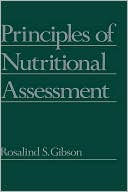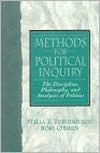Principles of Nutritional Assessment
Gibson, Rosalind S.
this Is A Comprehensive Text On The Methods - Dietary, Anthropometric, Laboratory And Clinical - Of Assessing The Nutritional Status Of Populations And Of Individuals In The Hospital Or The Community. This second Edition Incorporates Recent Data From National Nutritional Surveys In The Us And Europe; The Flood Of New Information About Iron, Vitamin A And Iodine; The Role Of Folate In Preventing Neural Tube Defects; The Use Of Hplc Techniques And Enzyme Assays; Improvements In Data Handling; And Many Other Developments.
A Paperback Edition Of This Book Is Available To Readers Living Outside Of North America And Europe. Interested Parties Should Contact The Author At: [email protected] Http://nutrition.earthlight.co.nz
doody Review Services
reviewer:denise M. Ney, Phd, Rd(university Of Wisconsin-madison)
description:this Second Edition Provides Updated And Expanded Information On Nutritional Assessment, Including An Enhanced International Perspective. This Edition Is Approximately 20 Percent Longer And Includes A Two-column Format Compared To The First Edition Published In 1990.
purpose:the Purpose Is To Provide An Up-to-date, Authoritative Reference Source And Working Textbook For The Four Major Nutritional Assessment Methods -- Dietary, Anthropometric, Laboratory, And Clinical. Nutritional Assessment Is A Major Field Within The Discipline Of Nutritional Sciences And Thus, This Book Provides Important And Needed Information. The Book Clearly Meets The Author's Objectives.
audience:the Book Is Suitable As A Reference For Researchers And Practitioners, Such As Dietitians Or Physicians, And As A Textbook For Graduate Students Or Advanced Undergraduate Students. I Would Not Consider It A Suitable Introductory Text For Undergraduates. The Author Is A Credible Authority In The Field Of Nutritional Assessment.
features:after An Introductory Chapter That Provides An Overview Of The Process Of Nutritional Assessment, The Remaining 26 Chapters Cover The Four Major Aspects Of Nutritional Assessment As Follows: Dietary Assessment, 7 Chapters; Anthropometric Assessment, 6 Chapters; Laboratory Assessment Organized According To Specific Nutrients, 11 Chapters; And Clinical Assessment, 2 Chapters. Assessment Of Both Groups And Individuals Are Covered For Each Of The Four Areas. Strengths Of The Book's Approach Include A Balanced International Perspective, Clear Figures And Diagrams, And An Easy-to-read Style. The Book Is Very Well Written. One Weakness Is That, Even Though The Book Has A 2005 Copyright Date, It Includes The 2000 Version Of The United States Dietary Guidelines Instead Of The 2005 Version Released Early In 2005, Page 222. This Is A Shortcoming For The U.s. Market.
assessment:this Second Edition Provides A Needed Update, Given The Significant Increase In Knowledge Related To Nutritional Assessment As Well As Heightened Research Interest In The Association Between Nutritional Status And Health. This Is Probably The Best Comprehensive Reference In The Field Because It Discusses The Scientific Principles Of Nutritional Assessment As Well As The Application Of Nutritional Assessment In Both Research And Clinical Practice Settings.
| Name in long format: | Principles of Nutritional Assessment |
|---|---|
| ISBN-10: | 0195058380 |
| ISBN-13: | 9780195058383 |
| Book pages: | 712 |
| Book language: | en |
| Edition: | 1 |
| Binding: | Hardcover |
| Publisher: | Oxford University Press |
| Dimensions: | Height: 6.44 Inches, Length: 9.56 Inches, Weight: 2.4361079951 Pounds, Width: 1.46 Inches |










